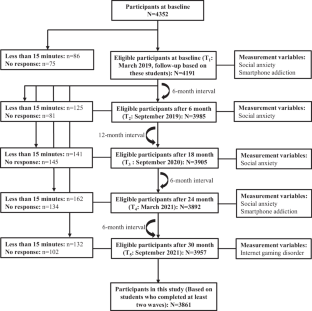International Journal of Mental Health and Addiction ( IF 8 ) Pub Date : 2024-04-12 , DOI: 10.1007/s11469-024-01300-5 Xiaomeng Li , Xiaoyan Chen , Ya Zhu , Xuliang Shi

|
The college stage is characterized by increased interpersonal interaction and intense social anxiety. Although the associations between social anxiety and internet-related addictive behaviors have been established, the question of whether the developmental trajectory of social anxiety is linked to subsequent internet-related addictive behaviors remains unexplored. Utilizing a longitudinal design combined with a person-centered approach, the current study examined the developmental trajectory of social anxiety among 3,861 students throughout their university years. Additionally, we explored the impacts of specific change patterns of social anxiety on subsequent internet-related addictive behaviors. The growth mixture modeling identified three distinct profiles of social anxiety: high-stable group (n=515, 13.33%), high-decreasing group (n=243, 6.30%), and low-decreasing group (n=3103, 80.37%). Furthermore, the results of binary logistic regression analysis revealed that students in the high-decreasing and low-decreasing groups were less likely to experience smartphone addiction and Internet game addiction compared to those in the high-stable group. These findings underscore the importance of identifying individuals with a high risk for social anxiety and providing them with personalized and effective mental health services to mitigate their susceptibility of developing internet-related addictive behaviors.
中文翻译:

大学生社交焦虑轨迹与互联网相关成瘾行为的纵向关联:五波调查研究
大学阶段的特点是人际交往增多和社交焦虑强烈。尽管社交焦虑与互联网相关成瘾行为之间的关联已经确定,但社交焦虑的发展轨迹是否与随后的互联网相关成瘾行为有关的问题仍有待探索。本研究采用纵向设计与以人为本的方法相结合,调查了 3,861 名学生整个大学期间社交焦虑的发展轨迹。此外,我们还探讨了社交焦虑的特定变化模式对随后的互联网相关成瘾行为的影响。增长混合模型确定了三种不同的社交焦虑特征:高稳定组(n = 515, 13.33%)、高下降组(n = 243, 6.30%)和低下降组(n = 3103, 80.37%) )。此外,二元逻辑回归分析的结果显示,与高稳定组的学生相比,高减少组和低减少组的学生出现智能手机成瘾和网络游戏成瘾的可能性较小。这些发现强调了识别社交焦虑高风险人群并为他们提供个性化和有效的心理健康服务以减轻他们发展与互联网相关的成瘾行为的可能性的重要性。



























 京公网安备 11010802027423号
京公网安备 11010802027423号